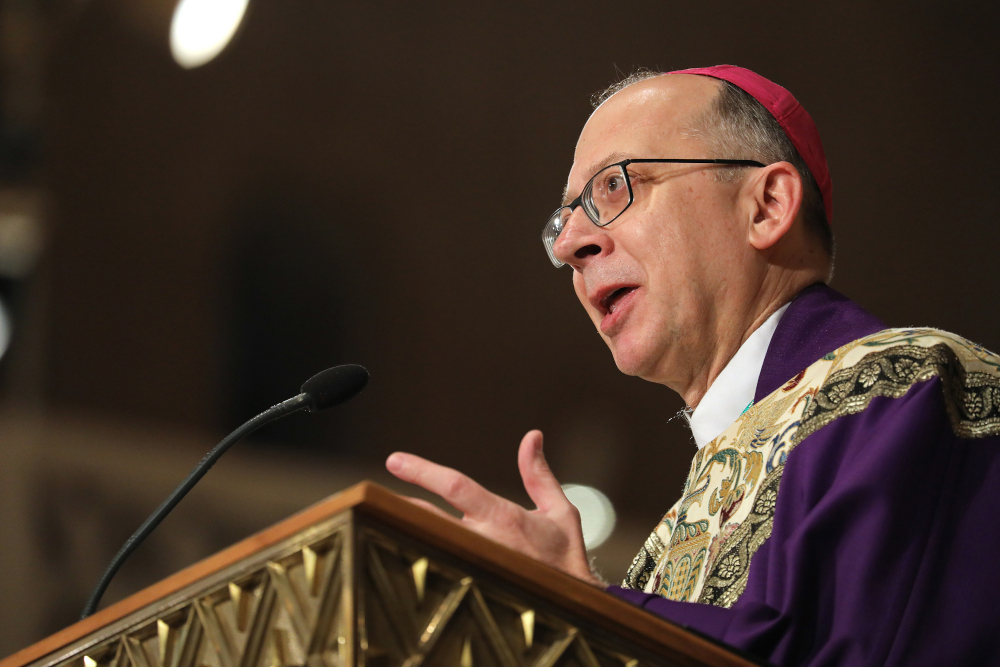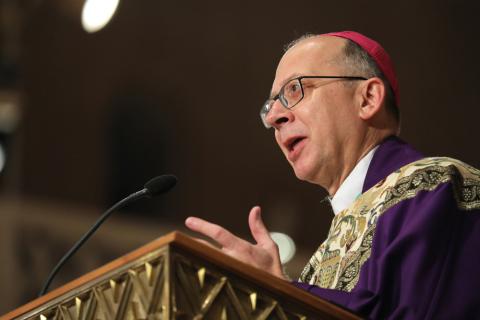
Bishop Barry C. Knestout of Richmond, Va., announced Feb. 17, 2020, the establishment of an Independent Reconciliation Program for people who, as minors, were sexually abused by the clergy of his diocese. It is a voluntary program through which victim survivors can receive compensation. Knestout is pictured in a Jan. 18, 2020, photo. (CNS/Bob Roller)

Bishop Barry C. Knestout of Richmond, Va., announced Feb. 17, 2020, the establishment of an Independent Reconciliation Program for people who, as minors, were sexually abused by the clergy of his diocese. It is a voluntary program through which victim survivors can receive compensation. Knestout is pictured in a Jan. 18, 2020, photo. (CNS/Bob Roller)
Bishop Barry C. Knestout of Richmond Feb. 17 announced the establishment of the diocese's Independent Reconciliation Program, which allows victim-survivors of clergy sexual abuse to receive monetary payment from the diocese.
With the program, he continues to fulfill the commitment he has made to those sexually abused by clergy as minors.
"We will never be able to fully compensate for the harm done and we recognize there are many routes that might be followed to achieve justice," Knestout wrote in a letter to the people of the diocese, posted on the diocesan website.
"We believe this to be the best course for our diocese to reach a just reconciliation with our victim-survivors," he said.
The establishment of the Independent Reconciliation Program follows an extensive, independent audit of clergy files in late 2018 to ensure that no one who had been credibly accused of sexually abusing a minor remained in ministry.
In February 2019, the bishop made public the names of priests against whom there were credible and substantiated allegations of abuse.
The program is independently administered by BrownGreer PLC, a Richmond-based firm that specializes in settlement administration.
BrownGreer PLC will be the sole entity in determining how much money a victim-survivor will receive from the voluntary program. Neither Knestout nor representatives of the diocese will have input into the decision.
Jennifer Sloan, the Diocese of Richmond's victim assistance coordinator and acting director of the Office of Safe Environment, said there is a good reason for having an independent administrator handle the program.
"Victim-survivors may not have a complete trust in the church. So, by having somebody separate from the diocese administrating this program, it allows credibility to the work that they're doing," she said, noting that it provides those who are not comfortable contacting the diocese directly an opportunity to work with a third party and to still be able to engage with the church "without having to engage with the church process."
In accepting a monetary settlement from the Independent Reconciliation Program, a victim-survivor will be required to sign a release. In doing so, he or she will give up the right to sue or receive any financial assistance from the Diocese of Richmond and BrownGreer PLC.
"In terms of settlements and the releases, those are pretty standard," Sloan explained. "Whether somebody enters into a settlement with the diocese, whether it's ours or any other, whether it's through a program or in a one-off case, it's standard to have somebody sign a release form."
Another component of the voluntary program is the diocese's commitment to protecting the privacy of victim-survivors. Information submitted by a victim-survivor to the claims administrator will remain confidential except as necessary to process the claim, reporting to the diocese so it may follow church processes and complying with state or federal law — including any requirements of Virginia's attorney general.
The diocese's emphasis on confidentiality does not preclude victim-survivors from talking about their claim and their abuse, according to Sloan.
"The church doesn't want to ever censor somebody's right to be able to share their experiences. We take peoples' privacy seriously," she said. "While we won't speak to individuals' experiences that they've had, they're more than welcome to share them because it's their story and we don't want to take that away from them."
Since the diocese does not know how many claims will be filed through the Independent Reconciliation Program, a specific amount of money has not been reserved. However, the diocese has identified several potential sources for funding it, including its self-insurance program, investments and, if needed, loans.
No money from the diocese's annual appeal, capital campaign, restricted endowments and restricted contributions will be used for the settlements.
Victim-survivors have until April 3 to initiate a claim. The filing deadline is May 15.
In his Sept. 14, 2018, pastoral letter, "From Tragedy to Hope," Knestout spoke about the need for and his commitment to healing among those who were sexually abused by clergy. Part of that commitment was an extensive audit of clergy files by an independent auditor to ensure that no one who had been credibly accused remained in ministry.
Following completion of the audit, he made public the names of priests against whom there were credible and substantiated allegations of abuse Feb. 13, 2019.
Advertisement



